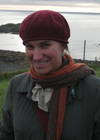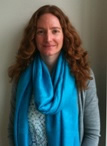Held each year at the University of Victoria, WordsThaw brings together writers, students, editors, publishers, and others with an interest in creative writing for a weekend of readings, panel discussions, workshops, and socializing.
Featured participants this year include Jordan Abel, Frances Backhouse, M.A.C. Farrant, Alisa Gordaneer, Christopher Gudgeon, Stella Harvey, Keith Jones, Anita Lahey, Jeremy Loveday, Elizabeth May, Arleen Paré, Molly Peacock, Kyeren Regehr, Troy Sebastian, Melanie Siebert, Kim Trainor, Laura Trunkey, Lynne Van Luven, Katherine Wagner, J.D. Zapf, Jan Zwicky, and many more.
Visit the WordsThaw website for schedule information, biographies of readers, and to buy tickets to events.
Anita Lahey - The Investigative Poet
 Victoria's Poet Laureate Yvonne Blomer talks with poet, journalist, reviewer and essayist Anita Lahey about her role as moderator for the panel titled The Investigative Poet. Panelists include poets Arleen Paré, Kim Trainor, and Kyeren Regehr. Tickets available here.
Victoria's Poet Laureate Yvonne Blomer talks with poet, journalist, reviewer and essayist Anita Lahey about her role as moderator for the panel titled The Investigative Poet. Panelists include poets Arleen Paré, Kim Trainor, and Kyeren Regehr. Tickets available here.
YB: Often poets are thought of as artists, those who can take facts or “truths” and do with them as they wish. How does this notion of the poet relate to your idea of poet as researcher or journalist?
AL: I’m thinking about how a poet can absorb a fact and transform it, through language, context, juxtaposition—how poets, unlike journalists, can take the fruits of their research and not so much present that data inaccurately, but find a home for it within a poem that gives it a changed reality, that maybe brings to the surface a different truth within the fact than the one we previously noticed or thought was important. This is how poets can offer a slant perspective, or turn our sense of reality (and their own) upside down. To create this kind of art a fidelity to the facts—a reliance on facts, of both the ordinary and extraordinary kind—is necessary, just not perhaps the sort of fidelity we are accustomed to in mainstream journalism.
Read the rest of Anita's interview on the Malahat website.
Heather Dean - Literary Afterlives
 Malahat Poetry Board member Christine Walde talks with Heather Dean, Associate Director of Special Collections at the University of Victoria Libraries, about her role as moderator for the panel titled Literary Afterlives: Exploring the Meaning and Values of Writers and Archives. Panelists include Nicholas Bradley, Lisa Goddard, and Jan Zwicky. Tickets available here.
Malahat Poetry Board member Christine Walde talks with Heather Dean, Associate Director of Special Collections at the University of Victoria Libraries, about her role as moderator for the panel titled Literary Afterlives: Exploring the Meaning and Values of Writers and Archives. Panelists include Nicholas Bradley, Lisa Goddard, and Jan Zwicky. Tickets available here.
CW: When it comes to archives, how are writers' archives both similar and different from other bodies of information, and what is so compelling about writers' archives? How do they help us to understand the writers' process?
HD: The archives of writers are like the personal archives of many people: they contain artifacts of our everyday lives from diaries and letters to legal and financial records. I think one of the things that make writers’ archives especially compelling is the public fascination with the personal lives of authors and their creative process. Writers’ archives, like the archives of other creatives, are fascinating because it can be difficult to untangle the personal from the professional. In order to understand a piece of writing it can be useful to look not only at drafts of writing but also at correspondence and diaries and the larger context in which an author was working and who their intellectual circle was.
Read the rest of Heather's interview on the Malahat website.